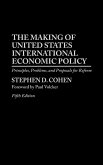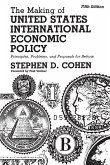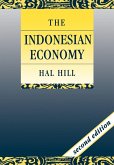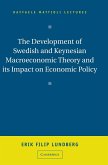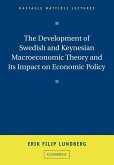Elhanan Helpman / Efraim Sadka (eds.)
Economic Policy in the International Economy
Herausgeber: Helpman, Elhanan; Sadka, Efraim
Elhanan Helpman / Efraim Sadka (eds.)
Economic Policy in the International Economy
Herausgeber: Helpman, Elhanan; Sadka, Efraim
- Gebundenes Buch
- Merkliste
- Auf die Merkliste
- Bewerten Bewerten
- Teilen
- Produkt teilen
- Produkterinnerung
- Produkterinnerung
This 2003 book contains fifteen major essays on international economics.
Andere Kunden interessierten sich auch für
![The Evolving International Economy The Evolving International Economy]() Graciela ChichilniskyThe Evolving International Economy28,99 €
Graciela ChichilniskyThe Evolving International Economy28,99 €![The Evolving International Economy The Evolving International Economy]() Graciela ChichilniskyThe Evolving International Economy74,99 €
Graciela ChichilniskyThe Evolving International Economy74,99 €![The Making of United States International Economic Policy The Making of United States International Economic Policy]() Stephen D. CohenThe Making of United States International Economic Policy105,99 €
Stephen D. CohenThe Making of United States International Economic Policy105,99 €![The Making of United States International Economic Policy The Making of United States International Economic Policy]() Stephen CohenThe Making of United States International Economic Policy64,99 €
Stephen CohenThe Making of United States International Economic Policy64,99 €![The Indonesian Economy The Indonesian Economy]() Hal HillThe Indonesian Economy72,99 €
Hal HillThe Indonesian Economy72,99 €![The Development of Swedish and Keynesian Macroeconomic Theory and its Impact on Economic Policy The Development of Swedish and Keynesian Macroeconomic Theory and its Impact on Economic Policy]() Erik Filip LundbergThe Development of Swedish and Keynesian Macroeconomic Theory and its Impact on Economic Policy74,99 €
Erik Filip LundbergThe Development of Swedish and Keynesian Macroeconomic Theory and its Impact on Economic Policy74,99 €![The Development of Swedish and Keynesian Macroeconomic Theory and Its Impact on Economic Policy The Development of Swedish and Keynesian Macroeconomic Theory and Its Impact on Economic Policy]() Erik Filip LundbergThe Development of Swedish and Keynesian Macroeconomic Theory and Its Impact on Economic Policy27,99 €
Erik Filip LundbergThe Development of Swedish and Keynesian Macroeconomic Theory and Its Impact on Economic Policy27,99 €-
-
-
This 2003 book contains fifteen major essays on international economics.
Hinweis: Dieser Artikel kann nur an eine deutsche Lieferadresse ausgeliefert werden.
Hinweis: Dieser Artikel kann nur an eine deutsche Lieferadresse ausgeliefert werden.
Produktdetails
- Produktdetails
- Verlag: Cambridge University Press
- Seitenzahl: 486
- Erscheinungstermin: 13. Juni 2016
- Englisch
- Abmessung: 235mm x 157mm x 31mm
- Gewicht: 848g
- ISBN-13: 9780521815192
- ISBN-10: 0521815193
- Artikelnr.: 29337781
- Herstellerkennzeichnung
- Books on Demand GmbH
- In de Tarpen 42
- 22848 Norderstedt
- info@bod.de
- 040 53433511
- Verlag: Cambridge University Press
- Seitenzahl: 486
- Erscheinungstermin: 13. Juni 2016
- Englisch
- Abmessung: 235mm x 157mm x 31mm
- Gewicht: 848g
- ISBN-13: 9780521815192
- ISBN-10: 0521815193
- Artikelnr.: 29337781
- Herstellerkennzeichnung
- Books on Demand GmbH
- In de Tarpen 42
- 22848 Norderstedt
- info@bod.de
- 040 53433511
Part I. Financial Issues in Open Economies: Theory: 1. Crises: the next
generation? Paul Krugman; 2. Solutions to the 'devaluation bias': some
preventive measures to defend fixed exchange rates against self-fulfilling
attacks Chi-Wa Yuen; 3. Growth enhancing effects of bailout guarantees
Aaron Tornell; 4. Risk and exchange rates Maurice Obstfeld and Kenneth S.
Rogoff; Part II. Financial Issues in Open Economies: Empirics: 5. Economic
integration, industrial specialization, and the asymmetry of macroeconomic
fluctuations Sebnem Kalemli-Ozcan, Bent E. Sorenson and Oved Yosha; 6.
Uncovered interest parity in crisis: the interest rate defense in the 1990s
Robert P. Flood and Andrew K. Rose; 7. When does capital account
liberalization help more than it hurts? Carlos Arteta, Barry Eichengreen
and Charles Wyplosz; 8. Sources of inflation in developing countries
Prakash Loungani and Phillip Swagel; Part III. Economic Growth: Theory and
Empirics: 9. Growth effects and the cost of business cycles Gadi Barlevy;
10. Explaining economic growth Yair Mundlak; Part IV. Public Economies: 11.
Simulating fundamental tax reform in the United States David Altig, Alan J.
Auerbach, Laurence J. Kotlikoff, Kent A. Smetters and Jan Walliser; 12. The
international macroeconomics of taxation and the case against European tax
harmonization Enrique G. Mendoza; 13. Home bias in portfolios and taxation
of asset income Roger H. Gordon and Vitor Gaspar; 14. Social dumping in the
transformation process; Part V. Political Economy: 15. Do political
institutions shape economic policy? Torsten Persson.
generation? Paul Krugman; 2. Solutions to the 'devaluation bias': some
preventive measures to defend fixed exchange rates against self-fulfilling
attacks Chi-Wa Yuen; 3. Growth enhancing effects of bailout guarantees
Aaron Tornell; 4. Risk and exchange rates Maurice Obstfeld and Kenneth S.
Rogoff; Part II. Financial Issues in Open Economies: Empirics: 5. Economic
integration, industrial specialization, and the asymmetry of macroeconomic
fluctuations Sebnem Kalemli-Ozcan, Bent E. Sorenson and Oved Yosha; 6.
Uncovered interest parity in crisis: the interest rate defense in the 1990s
Robert P. Flood and Andrew K. Rose; 7. When does capital account
liberalization help more than it hurts? Carlos Arteta, Barry Eichengreen
and Charles Wyplosz; 8. Sources of inflation in developing countries
Prakash Loungani and Phillip Swagel; Part III. Economic Growth: Theory and
Empirics: 9. Growth effects and the cost of business cycles Gadi Barlevy;
10. Explaining economic growth Yair Mundlak; Part IV. Public Economies: 11.
Simulating fundamental tax reform in the United States David Altig, Alan J.
Auerbach, Laurence J. Kotlikoff, Kent A. Smetters and Jan Walliser; 12. The
international macroeconomics of taxation and the case against European tax
harmonization Enrique G. Mendoza; 13. Home bias in portfolios and taxation
of asset income Roger H. Gordon and Vitor Gaspar; 14. Social dumping in the
transformation process; Part V. Political Economy: 15. Do political
institutions shape economic policy? Torsten Persson.
Part I. Financial Issues in Open Economies: Theory: 1. Crises: the next
generation? Paul Krugman; 2. Solutions to the 'devaluation bias': some
preventive measures to defend fixed exchange rates against self-fulfilling
attacks Chi-Wa Yuen; 3. Growth enhancing effects of bailout guarantees
Aaron Tornell; 4. Risk and exchange rates Maurice Obstfeld and Kenneth S.
Rogoff; Part II. Financial Issues in Open Economies: Empirics: 5. Economic
integration, industrial specialization, and the asymmetry of macroeconomic
fluctuations Sebnem Kalemli-Ozcan, Bent E. Sorenson and Oved Yosha; 6.
Uncovered interest parity in crisis: the interest rate defense in the 1990s
Robert P. Flood and Andrew K. Rose; 7. When does capital account
liberalization help more than it hurts? Carlos Arteta, Barry Eichengreen
and Charles Wyplosz; 8. Sources of inflation in developing countries
Prakash Loungani and Phillip Swagel; Part III. Economic Growth: Theory and
Empirics: 9. Growth effects and the cost of business cycles Gadi Barlevy;
10. Explaining economic growth Yair Mundlak; Part IV. Public Economies: 11.
Simulating fundamental tax reform in the United States David Altig, Alan J.
Auerbach, Laurence J. Kotlikoff, Kent A. Smetters and Jan Walliser; 12. The
international macroeconomics of taxation and the case against European tax
harmonization Enrique G. Mendoza; 13. Home bias in portfolios and taxation
of asset income Roger H. Gordon and Vitor Gaspar; 14. Social dumping in the
transformation process; Part V. Political Economy: 15. Do political
institutions shape economic policy? Torsten Persson.
generation? Paul Krugman; 2. Solutions to the 'devaluation bias': some
preventive measures to defend fixed exchange rates against self-fulfilling
attacks Chi-Wa Yuen; 3. Growth enhancing effects of bailout guarantees
Aaron Tornell; 4. Risk and exchange rates Maurice Obstfeld and Kenneth S.
Rogoff; Part II. Financial Issues in Open Economies: Empirics: 5. Economic
integration, industrial specialization, and the asymmetry of macroeconomic
fluctuations Sebnem Kalemli-Ozcan, Bent E. Sorenson and Oved Yosha; 6.
Uncovered interest parity in crisis: the interest rate defense in the 1990s
Robert P. Flood and Andrew K. Rose; 7. When does capital account
liberalization help more than it hurts? Carlos Arteta, Barry Eichengreen
and Charles Wyplosz; 8. Sources of inflation in developing countries
Prakash Loungani and Phillip Swagel; Part III. Economic Growth: Theory and
Empirics: 9. Growth effects and the cost of business cycles Gadi Barlevy;
10. Explaining economic growth Yair Mundlak; Part IV. Public Economies: 11.
Simulating fundamental tax reform in the United States David Altig, Alan J.
Auerbach, Laurence J. Kotlikoff, Kent A. Smetters and Jan Walliser; 12. The
international macroeconomics of taxation and the case against European tax
harmonization Enrique G. Mendoza; 13. Home bias in portfolios and taxation
of asset income Roger H. Gordon and Vitor Gaspar; 14. Social dumping in the
transformation process; Part V. Political Economy: 15. Do political
institutions shape economic policy? Torsten Persson.




